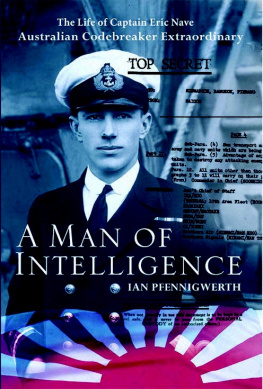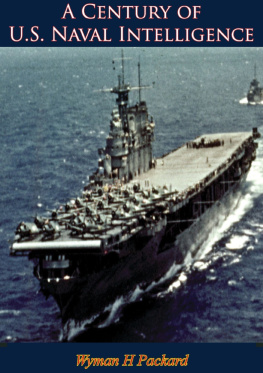


The latest edition of this work has been brought to publication with the generous assistance of Marguerite and Gerry Lenfest.
Naval Institute Press
291 Wood Road
Annapolis, MD 21402
1946 by Ellis M. Zacharias
All rights reserved. No part of this book may be reproduced or utilized in any form or by any means, electronic or mechanical, including photocopying and recording, or by any information storage and retrieval system, without permission in writing from the publisher.
First Bluejacket books printing, 2003
ISBN 978-1-61251-769-8 (eBook)
The Library of Congress has cataloged the paperback edition as follows:
Zacharias, Ellis M., 1890
Secret Missions : the story of an intelligence officer / by Ellis M. Zacharias.
p. cm. (Bluejacket books)
Originally published: New York: G. P. Putnam, 1946
Includes bibliographical references and index.
1. Zacharias, Ellis M., 1890 2. United States. NavyOfficersBiography. 3. AdmiralsUnited StatesBiography. 4. World War, 1939-1945Military Intelligence. 5. World War, 1939-1945Naval operations, American. 6. World War, 1939-1945CampaignsPacific Area. I. Title. II. Series.
V63.Z33 A3 2003
940.548673902dc21
[B]
2002041096
 Print editions meet the requirements of ANSI/NISO z39.48-1992 (Permanence of Paper).
Print editions meet the requirements of ANSI/NISO z39.48-1992 (Permanence of Paper).
9 8 7 6 5 4 3 2
Frontispiece photo courtesy of Jerrold M. Zacharias
To My Wife
CONTENTS
ALTHOUGH AN INSTANT bestseller when it was first published during the fall of 1946 and again when it briefly appeared in paperback after the authors death in June 1961, Secret Missions nonetheless soon faded from the public memory. Now, thanks to the Naval Institute Press and its nonpareil Bluejacket Books series, the autobiography by Ellis M. Zacharias, then a captain in the U.S. Navy, is rescued from an obscurity it doesnt deserve.
Essentially a personal account of nearly forty years of service that begins in 1908 and concludes in 1946 with the rank of rear admiral, the astonishingly detailed memoir offers far, far more. Readers are not only privy to the rare psychological profiles of preWorld War II Japanese political and military leaders, such as Nomura, Suzuki, Takagi, Yamamoto, Uyeda, and Yonai, that Zacharias prepared for the Office of Naval Intelligence but also learn of the role he played in easing the Japanese nation into surrender in 1945 by defining the term unconditional surrender. Zacharias made one of our first ventures into the realm of psychological warfare via a series of broadcasts beamed at Japan, stressing in impeccable Japanese the futility of continued fighting and that submission didnt imply an overturning of the national system or traditional way of life.
With his acuity of judgment (all too lacking in todays assessments of the Pacific war and its personalities), Zacharias writes in a style that allows us to experience his story vicariously. For example, in 1912 we are present on the Naval Academy field when hes commissioned an ensign and then accompany him on his first assignment as an engineer officer aboard the battleship Virginia. After service on several cruisers during World War I, he is appointed assistant naval attach to Japan. In late 1920, when he is dispatched to the U.S. Embassy in Tokyo by the Office of Naval Intelligence to acquire a further knowledge of the Japanese language and the people of Japan, we learn that the young lieutenant commander is the only officer in the entire U.S. fleet who can speak and write a few words of Japanese.
Amid the delightful whirl of semidiplomatic parties and a naval attachs social life, Zacharias goes to school and completely masters the language while diligently studying the people and their character. By 1922 he is convinced that the Japanese navy had begun thinking in terms of an intercontinental war with America but dreads the possibility for realistic reasons. Immediately, the lieutenant commander succeeds in gaining the confidence of several military leaders destined for dominating positions in the war to come. Zachariass goal: gather as much information on the Japanese military as possible and somehow get it to the ONI with equal speed.
In 1967, almost half a century later, a very close colleague and personal friend, Rear Adm. Cecil H. Coggins (Ret.), recalled the lieutenant commanders determination to get crucial intelligence out of Japan during those troubling 1922-23 years.
Zach was remarkable. Active, lean, alert, and full of energy, with bright eyes and a broad smile, he made friends with the Japanese naval officers and never forgot one of them. With his nimble mind and retentive memory went the prime quality of imagination. In a flash he could see the potentialities of an idea that would completely escape the average attach officer. While his contemporaries were groping to grasp a concept, he had already understood it, developed a dozen possible corollaries, rejected some, and was always making plans to put the rest into effect. When it became obvious that even if the problem of retaining military information could be solved, getting it out of the country was a much bigger problem. After the Washington Naval Limitation Conference, held in 1921, which had established a 5:5:3 ratio of naval shipbuilding for the U.S., Great Britain, and Japan, Zach didnt trust the Japanese to stick to their side of the agreement. Soon he was in the thick of things.
Although the lieutenant commander remained first and foremost an assistant naval attach and language officer assigned to the U.S. Embassy in Tokyo until 1 November 1923, his first love was intelligence. Yet Zacharias was proud of his seamanship, and now that his tour of duty was about to end he sought the bridge of a ship to command.
Upon his return to Washington, D.C., Zacharias expected someone in the Office of Naval Intelligence to promote his perspective on the increasing Japanese effort to wage war in the Pacific. We read that although friends he encountered in the Army and Navy Clubs grill sympathized with him, no one in the ONI gave a damn.
From 1924 onwards we follow the lieutenant commanders naval career as he alternates between sea duty and the intelligence service, specializing in Far Eastern affairs. Were there when Zacharias learns of each phase of Japanese aggression in the 1930s, tracks enemy spies on the West Coast, and listens politely as Adm. Husband E. Kimmel, then commander of the Pacific Fleet, rejects outright his prediction in March 1941 that the Japanese will undoubtedly attack Pearl Harbor with an air strike from the north on a Sunday morning in late November or early December.
Next page









 Print editions meet the requirements of ANSI/NISO z39.48-1992 (Permanence of Paper).
Print editions meet the requirements of ANSI/NISO z39.48-1992 (Permanence of Paper).